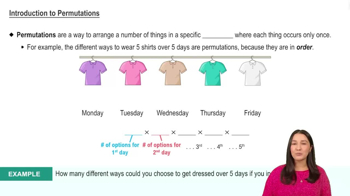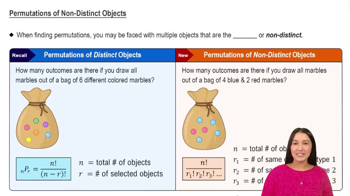Table of contents
- 0. Review of Algebra4h 16m
- 1. Equations & Inequalities3h 18m
- 2. Graphs of Equations43m
- 3. Functions2h 17m
- 4. Polynomial Functions1h 44m
- 5. Rational Functions1h 23m
- 6. Exponential & Logarithmic Functions2h 28m
- 7. Systems of Equations & Matrices4h 6m
- 8. Conic Sections2h 23m
- 9. Sequences, Series, & Induction1h 19m
- 10. Combinatorics & Probability1h 45m
10. Combinatorics & Probability
Combinatorics
Problem 79
Textbook Question
How many different ways can a director select 4 actors from a group of 20 actors to attend a workshop on performing in rock musicals?
 Verified step by step guidance
Verified step by step guidance1
<insert step 1> Identify that this is a combination problem because the order of selection does not matter.>
<insert step 2> Use the combination formula: \( \binom{n}{r} = \frac{n!}{r!(n-r)!} \), where \( n \) is the total number of items to choose from, and \( r \) is the number of items to choose.>
<insert step 3> Substitute the values into the formula: \( n = 20 \) and \( r = 4 \), so it becomes \( \binom{20}{4} = \frac{20!}{4!(20-4)!} \).>
<insert step 4> Simplify the expression: \( \frac{20!}{4! \times 16!} \).>
<insert step 5> Calculate the factorials and simplify further to find the number of combinations.>
Recommended similar problem, with video answer:
 Verified Solution
Verified SolutionThis video solution was recommended by our tutors as helpful for the problem above
Video duration:
3mPlay a video:
Was this helpful?
Key Concepts
Here are the essential concepts you must grasp in order to answer the question correctly.
Combinations
Combinations refer to the selection of items from a larger set where the order of selection does not matter. In this context, the director is choosing 4 actors from a group of 20, which is a classic example of a combination problem. The formula for combinations is given by C(n, r) = n! / (r!(n - r)!), where n is the total number of items, r is the number of items to choose, and '!' denotes factorial.
Recommended video:

Combinations
Factorial
A factorial, denoted as n!, is the product of all positive integers up to n. It is a fundamental concept in combinatorics, used to calculate the total arrangements or selections of items. For example, 5! = 5 × 4 × 3 × 2 × 1 = 120. Factorials are essential in the combinations formula, as they help determine the number of ways to arrange or select items.
Recommended video:

Factorials
Binomial Coefficient
The binomial coefficient, often represented as C(n, r) or 'n choose r', quantifies the number of ways to choose r elements from a set of n elements without regard to the order of selection. It is calculated using the formula C(n, r) = n! / (r!(n - r)!). This concept is crucial for solving problems involving selections, such as determining how many different groups of actors can be formed.
Recommended video:
Guided course

Special Products - Cube Formulas

 4:4m
4:4mWatch next
Master Fundamental Counting Principle with a bite sized video explanation from Callie
Start learning



